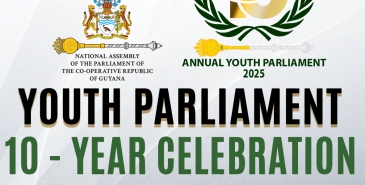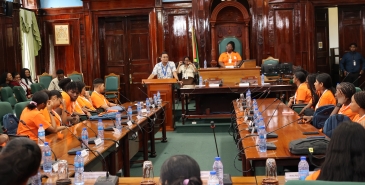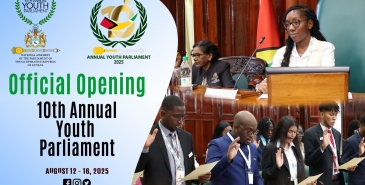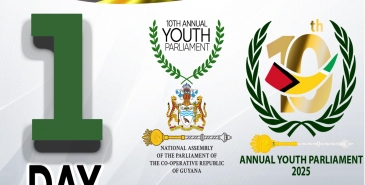A Breach of Fundamental Rights
Speech delivered at: 31st Sitting- Tenth Parliament - 22 November, 2012
22 November, 2012
10219
Mr. B. Williams: A breach of fundamental rights.
In the first instance, if I might respectfully deal with the sub judice rule, I refer to the advice of eminent Senior Counsel Mr. Rex McKay given to you. This is what he has to say on the question of sub judice.
“I think that the existence of Constitutional Motion No. 69 0f 2012 (which was just quoted by the Hon. Attorney General) does not restrict further action or comment in the National Assembly.”
I will repeat the advice of eminent Senior Counsel Mr. Rex. McKay:
“I think that the existence of Constitutional Motion No. 69 of 2012 does not restrict further action or comment in the National Assembly.”
He goes on by referring to Constitutional Motion No. 69 filed by the Hon. Attorney General, and says:
“The said motion is a sham and an abuse of process intended to gag the National Assembly from discussing the consequences of the motion.”
This is the same advice that the Hon. Attorney General has been regaling us on national television, asserting that it is gospel. Now he stands up in this Hon. House today to knock it down. He must understand that we are very keen on this side in these matters. Even the common law does not support the contention of the Hon. Attorney General. Mr. McKay refers to Van Syna and Myrr, 1994, through Hollinger report and the reasoning of the greatest of the greats, Lord Denning. He says:
“I know it is commonly supposed that once a writ is issued it puts a stop to discussion. If anyone wishes to canvas the matter in the press or in public it cannot be permitted it is said to be sub judice. I venture to suggest that it is a complete misconception. The sooner it is corrected – and it will be corrected today – the better.”
I should say it ought to be corrected today. My humble apologies, Mr. Speaker.
“It is a matter of public interest; it can be discussed at large without fear of thereby being in contempt of court.”
This is a strong statement.
“Criticisms can continue to be made and can be repeated. Fair comment does not prejudice a fair trial.
This was pointed out by Salomon, Lord J, in Thomson and Times Newspaper. I quote
“The law says, and says emphatically, that the issue of a writ is not to be used so as to muzzle and prevent discussion.”
I do not think I need to go further.
Mr. Speaker: Actually, yes, you do. Mr. Williams that case deals with discussion, muzzling and going through the merits or demerits of a matter. We have a motion which seeks to take an action.
Mr. B. Williams: With respect Mr. Speaker, the Attorney General’s contention is that we cannot proceed because he has filed Constitutional Motion No.69 of 2012. That is what he is saying; and that it is substantially the same thing we are discussion in the present motion. It is very clear. If I can continue Mr. Speaker, Mr. McKay refers to the 22nd Edition of May’s Parliamentary Practice. He refers to this passage in the 22nd Edition and says it is of some relevance in considering the sub judice rule:
“…and matters which do not touch upon issues which are sub judice are unlikely to affect any judgement.”
So what we are saying is what is this going to effect? What judgement is this going to affect if we discuss that. Mr. Speaker, the very Attorney that the Hon. Attorney General was regaling us and asserting on the National Media this is what his opinion is. However, I think there is even a higher authority than that in this National Assembly. Might I respectfully refer to the Minutes of the first meeting of the Committee on Appointments held on Friday, 16th March, 2012 at paragraph 1.2.1.6. This is a decision of this House by no less a person than you, sir, the Hon. Speaker of the National Assembly. It is reported you said…
Mr. Speaker: What are you quoting from?
Mr. B. Williams: From the Minutes of the first meeting of the Committee on Appointments held on Friday, 16th March, 2012.
Mrs. Backer: Mr. Speaker, if I may, as recent as yesterday when the Committee on Appointments met the Minutes were confirmed in the presence of no less a person than the Hon. Gail Teixeira.
Mr. B. Williams: Thank you for that.
“The Speaker then informed the Committee that after consulting the Clerk of the National Assembly (who is the expert in these matters as far as I am concerned), and the Head of the Committees Division, he wishes to place on record that, (and he is quoted,) “whether there was an order blocking me as The Speaker or not there is no way I can bow to the High Court to make this Parliament an inferior court or place than the High Court.
We salute you on this side, Sir, for those words.
Mr. Speaker: That will not help your argument. You can go past that.
Mr. B. Williams: There is no higher authority. I continue.
“It would be a sad, sad, day not only for this Tenth Parliament, but for parliaments that are to come, if I were to allow this Parliament, which I know to be the most important of the three arms of the state, to just defer all of its business because a motion has simply been filed.
I rest my case on this issue of sub-judice.
The second issue is about the question of right to speak under Article 146. I am not sure where the Attorney General was going, with respect, but he refers to Sabaroche. Sabaroche was a case which dealt with suspension of a member, not preventing a member from speaking.
Mr. Speaker: Mr. Williams, members have rights. One of them is to attend, one is to speak. To use your term we may want to apply the reasoning mutatis mutandis.
Mr. B. Williams: Yes, Sir, but if you may just bear with me. I think he said what the decision was. However, this is the decision because I have the authority with me.
“further the powers under section 52 (which is equivalent to Article 165 in our Constitution) must be exercised in accordance with the provisions of the constitution and the courts have jurisdiction to inquiry into the validity of the exercise of those powers and to ensure that a member of the House is not barred from his seat except in accordance with the House’s rules or Standing Orders.”
That is what we are relying on. [Interruptions] If I am allowed your protection Hon. Speaker, we are relying on Standing Order No. 47, rule 10. I should quote the Standing Order for the benefit of the Hon. Attorney General:
“Nothing in this Standing Order shall be taken to deprive the Assembly of the power of proceeding against any Member according to any resolution of the Assembly.”
And we are proceeding under Resolution 18, passed in this Hon. House on 26th.
Mr. Speaker: How do you answer the question Mr. Williams that Standing Order No. 47(10) comes under the umbrella of 47 as it relates to order in the Assembly? In other words, whatever the House needs to do to maintain order in the Assembly it has the power to do because the preeminent wish is to have order.
Mr. B. Williams: Sir, if I could respond, when one reads Standing Order No. 47 and Standing Order No. 47(10) which is the final rule under the Standing Order No. 47 it says, “nothing in this Standing Order”, in other words nothing that was discussed in this Standing Order shall prevent or restrain this National Assembly from proceeding against any Member on any resolution. That is what it is saying. In other words it operates without the provisions of Article 47. [Interruption] What constitution? We are talking about the Standing Orders. Listen and learn. However, as I said, there is no greater authority in this House than the Speaker himself. Again, I have to resort to the security of the utterances and wisdom of the Hon. Speaker of this Hon. House.
Sir, might I respectfully refer this Hon. House to your ruling of the 8th November, 2012; the ruling on the right of Mr. Clement J. Rohee to participate in the House as the Minister of Home Affairs and I refer in particular to paragraph 7. You said here in this ruling:
“As uncomfortable and as unpleasant as it is for me to have to make a ruling in this instance, I must stand on the side of the rule of law, and by applying my own deliberate judgement, and adopting the opinion of Counsel...”
And these are the material words.
“...find that in the absence of a Resolution of this august House, that specifically sanctions the member, and directs that he be restrained from speaking in any one or more capacities, I am, by law, duty bound to rule that he must be allowed to speak.”
So you are saying that if there is a Resolution of this House that restrains the Minister or prevents him from speaking, you will be bound and this House will be bound. That is what your ruling was. And if that was not transparent enough for my Hon. Friends on the other side, this was how you concluded in that ruling:
“Consequent upon my ruling, Members of the House may wish to consider whether a substantive Motion on the subject of the Hon. Member’s participation in the House should be pursued or not.”
Mr. Speaker, we have taken your advice and we are pursuing it with the present motion that is being debated before this Hon. House. Why should we question wisdom when it is there in abundance?
I would just like to say in relation to Article 146, which I believe with respect, has not application to the issue at hand. Even under the Constitution, there is no right that is an absolute right. No right is absolute. Even under that it is limited. It is limited by liable, et cetera, but in this Hon. House also we have limitations. We cannot use certain words in our debate in this Hon. House. We cannot say what we like in this Hon. House, so this is also limited. The very said same Order 26, that was refer to by my learned Friend and Hon. Attorney General, also restricts the right to speak in this Parliament on a motion. You cannot speak on a motion as according to you which was substantially the same as was discussed before – you cannot do that in the same session of the Parliament or in the same Parliament. I could go exactly to that.
So even in this House you are restrained and this Hon. House is replete with examples of the application of that principle. Under previous Speaker, your predecessor, the Hon. Mr. Sase Narain, the Hon. Gajraj and the Hon. Ramkarran, persons were prevented from speaking in this Hon. House, including yourself Hon. Speaker. And if my memory serves me correctly ... [Mr. Nandlall: So the man must be banned from speaking in the House?] Hello young man, abide what I am saying.
If my memory serves me correctly, I recall the self same Hon. Clement Rohee, who has now taken a seat again, he advised your predecessor the Hon. Ramkarran, not to leave his seat to come outside. So previous Parliaments are replete with instances of constraining and restraining of Members of this Hon. House and so in response to the Hon. Attorney General, I am asking that you find that the sub-judicial role does not affect us in proceeding with our business in this Hon. House. And (2), under Standing Order No. 47, rule 10, we have the right to proceed on any resolution that emanated from a motion that was moved under Article 171 of our Constitution, which is replicated in Standing Order No. 25 of the rules of Parliament, which gives us the right to propose any motion, which shall be debated in this Hon. House.
If we are given such a right and we pass a motion, we cannot act in vain. Parliament and the National Assembly cannot act in vain. We must be efficacious and so it is a natural corollary that if we can pass a motion, we should be able to act on that motion, insofar as it does not breach the Constitution of Guyana.
My respectful submission is that moving a motion and pursuing the Resolution emanating from that motion is not the subject of Constitutional recourse to the court, that was decided in the Privy Council’s authority of Sinemet, the Methodist Church of the Bahamas and Sinemet, where a similar position in the Bahamian Constitution, similar to Article 171 and the Standing Orders and Article 165 - which talks about regulating our own procedures, was discussed by the Privy Council. They held that you could not give it should a strict interpretation as to be the occasion for recourse to the court. In other words, you cannot go to court on that and that is high authority- the authority of the Privy Council. I do not think, Sir that it is a session in court – this is the highest court – but I do not think there is a session in the High Court of the Supreme Court.
I do not wish to bore listeners any further, but it is safely just to say that this motion is well founded, it does not affect the rules of sub-judice nor does it affect the right to speak as adumbrated or outlined by the Attorney General. It was not something that was substantially discussed before. In fact, it has nothing to do with the no-confidence motion whatsoever. This is a motion complete within itself... [Interruption]... Yes but, we are not discussing the no-confidence motion that was only to give you the context. I am asking that you rule that the motion is properly founded before this Hon. House. Thank you very much.
Speech delivered by:
What's New

17 August, 2025
10th Annual Youth Parliament Closes: Celebrating a Decade of Impact, Excellence, and Youth Empowerment10th Annual Youth Parliament Closes: Celebrating a Decade of Impact, Excellence, and Youth Empower

13 August, 2025
Youth Parliamentarians Assemble for Grand Rehearsals for the 10th Annual Youth Parliament

12 August, 2025
10th Annual Youth Parliament Kicks Off – Young Voices, Bold Ideas, Bright Futures!

11 August, 2025
10th Annual Parliament Kicks off tomorrow

